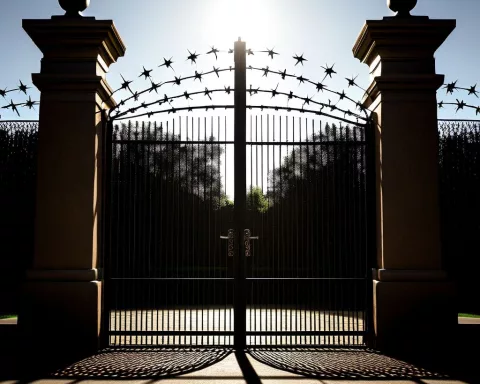Residents of Bromwell Street in Cape Town are fighting eviction from their long-term homes, highlighting the ongoing challenges faced by South Africa’s underprivileged urban population. The legal battle brings to light the discord between existing housing policies and ground realities, perpetuating spatial apartheid and pushing evicted individuals towards the city periphery. The community is anxiously awaiting a decision that will allow them to maintain their homes and secure their livelihoods and futures.
Bromwell Street residents face an uncertain future as they fight eviction from their long-term homes in Cape Town. Their struggle highlights the persistent challenge of South Africa’s underprivileged urban population in the face of apartheid’s enduring legacy, spatial inequality, and housing instability. The legal battle underscores the discord between existing housing policies and ground realities, pushing evicted individuals towards the city periphery and perpetuating spatial apartheid. The community waits nervously for a decision that will allow them to maintain their homes and safeguard their livelihoods and futures.
A Modern Legal Battle for Housing Rights
As the echoes of Cape Town’s infamous District Six evictions reverberate into the present, Bromwell Street residents face an uncertain future. The Constitutional Court’s recent decision to postpone judgement on the eviction lawsuit involving these long-term citizens illustrates a tangled mix of social-economic rights, legislative housing policies, and the haunting shadow of apartheid-era forced expulsions.
In the heart of Woodstock, Cape Town, Bromwell Street cottages are home to a vibrant community of working professionals and students, all pursuing better lives in the city. These homes, purchased by Woodstock Hub Pty Ltd in 2013 for a total of R3.15 million, became the center of a legal struggle in 2016. With the support of the housing advocacy collective Ndifuna Ukwazi (NU), the residents contested what they perceived to be unconstitutional housing policies enforced by the City of Cape Town.
In 2021, they achieved a temporary victory when the Western Cape High Court declared the City’s emergency housing policy unconstitutional and ordered the provision of emergency housing in the city for the affected Bromwell families. This decision was reversed by the Supreme Court of Appeal in 2023, a ruling that the residents and NU are currently contesting.
The Historical Context: A Resounding Echo from District Six
During the hearing, Justice Mbuyiseli Madlanga highlighted the striking similarities between the ongoing Bromwell Street eviction and the mass eviction of District Six during apartheid. His question, “Is this not a refined, modern-day District Six type of displacement?” encapsulates the crux of the issue: the persistent struggle of South Africa’s underprivileged urban population with the enduring legacy of apartheid, spatial inequality, and housing instability.
Representing the residents, Advocate Sheldon Magardie contended that the city’s emphasis on social housing over accommodation in the city centre effectively barred evicted individuals from accessing housing. He pointed out that numerous Bromwell Street inhabitants wouldn’t qualify for the city’s social housing initiatives due to their insufficient income.
This eviction struggle underlines the evident discord between existing housing policies and ground realities. Present policies seemingly push underprivileged, evicted individuals towards the city periphery, thereby perpetuating spatial apartheid – the division of urban spaces along racial and socio-economic boundaries.
The Legal Debate: Housing Policies vs. Spatial Justice
However, Magardie’s argument faced opposition from Justice Leona Theron, who questioned the specific policy and sections deemed unconstitutional. Advocating for the City, Karrisha Pillay SC posited that there was no legal requirement for the City to provide emergency accommodation in the city centre for evicted individuals.
Pillay highlighted that the city had proposed temporary emergency housing in Wolwerivier, Maitland, and Kampies. These offers were refused by the Bromwell Street residents. Nevertheless, the truth remains that these proposed areas lie on the boundaries of the city, creating significant obstacles for the residents who work and attend schools within the city’s confines.
Acting Justice Matthew Chaskalson wondered whether the Bromwell Street case should be perceived as a special circumstance or an ordinary eviction case. Justice Chaskalson recognized the unique historical backdrop of the Bromwell Street community, noting that it was one of the few communities to survive apartheid intact in a predominantly Caucasian area.
The Bromwell Street eviction is not just about a group of tenants facing eviction. It’s a heartrending tale of a community trapped between the forces of urban growth and historical spatial segregation. It highlights the ongoing dilemma for South Africa’s urban development: how to balance progression with the socio-economic rights of its citizens.
Holding the Breath: An Uncertain Future Awaits
The judgement was postponed, leaving Bromwell Street’s residents in a state of uncertainty. The City of Cape Town is wrestling with the complexities of housing policies and spatial justice. Meanwhile, the community nervously waits, hoping for a decision that will allow them to maintain their homes and, by extension, safeguard their livelihoods and futures.
What is the Bromwell Street eviction dilemma?
The Bromwell Street eviction dilemma refers to the legal battle being fought by long-term residents of Bromwell Street in Cape Town who are facing eviction from their homes. The struggle highlights the ongoing challenges faced by South Africa’s underprivileged urban population in the face of apartheid’s enduring legacy, spatial inequality, and housing instability.
What is the role of Ndifuna Ukwazi in the Bromwell Street eviction case?
Ndifuna Ukwazi is a housing advocacy collective that is supporting the residents of Bromwell Street in their legal battle against what they perceive to be unconstitutional housing policies enforced by the City of Cape Town. The organization has been instrumental in bringing attention to the issue and providing legal assistance to the residents.
What is the historical context of the Bromwell Street eviction?
The Bromwell Street eviction echoes the mass eviction of District Six during apartheid. Justice Mbuyiseli Madlanga highlighted the striking similarities between the two cases, emphasizing the persistent struggle of South Africa’s underprivileged urban population with the enduring legacy of apartheid, spatial inequality, and housing instability.
What is the legal debate surrounding the Bromwell Street eviction?
The legal debate surrounding the Bromwell Street eviction centers on the conflict between existing housing policies and the concept of spatial justice. The City of Cape Town argues that there is no legal requirement for the City to provide emergency accommodation in the city center for evicted individuals, while the residents and their advocates contend that existing policies effectively bar evicted individuals from accessing housing.
What is the significance of the Bromwell Street case?
The Bromwell Street case highlights the ongoing dilemma for South Africa’s urban development: how to balance progression with the socio-economic rights of its citizens. It underscores the discord between existing housing policies and ground realities, pushing evicted individuals towards the city periphery and perpetuating spatial apartheid.
What is the current status of the Bromwell Street eviction case?
The judgement on the Bromwell Street eviction case has been postponed, leaving residents in a state of uncertainty. The City of Cape Town is grappling with the complexities of housing policies and spatial justice, while residents wait for a decision that will allow them to maintain their homes and secure their livelihoods and futures.












